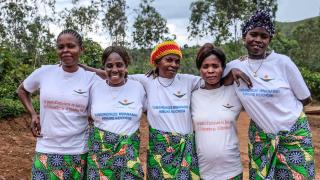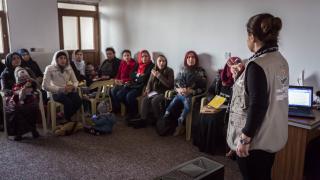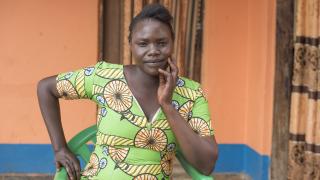Tackling an invisible killer with soap and water
On Global Handwashing Day, we’re celebrating women who are leading the fight against COVID-19 and other life-threatening diseases, by championing hand hygiene.
Evidence suggests that during conflict, three to fifteen times as many people die of indirect causes as are killed in fighting - with infectious diseases being one of the biggest killers.
Multiple risk factors exacerbate the spread of diseases in conflict-affected countries, including shattered infrastructure and healthcare systems, and lack of access to safe water and sanitation. Women are often hardest hit during outbreaks, as they perform the majority of caregiving and have less access to health care and information to keep themselves safe.
The lethal convergence of conflict and disease can be seen in many of the countries where we work. Northern Nigeria is affected by yearly cholera outbreaks, which have surged during the past decade of Boko Haram insurgency. In the Democratic Republic of Congo, militia violence fuels the spread of multiple diseases, including the deadly Ebola virus. The overcrowded camps and low-quality accommodation which shelter displaced families in northern Iraq provide ideal conditions for outbreaks of respiratory infections and waterborne diseases.
Now, the most vulnerable communities in conflict-affected countries are facing an additional threat: COVID-19.
The importance of handwashing
Handwashing with soap and water is the critical first line of defence against COVID-19 and other deadly diseases – it’s easy, effective and inexpensive.
Yet in the communities where we work, practicing safe hygiene can be extremely difficult due to lack of resources such as clean water and soap. With your support, we’ve installed handwashing stations at our training locations and provided women with essential hygiene supplies for their homes. Our trainers have also been sharing knowledge about safe hygiene and proper handwashing during classes.
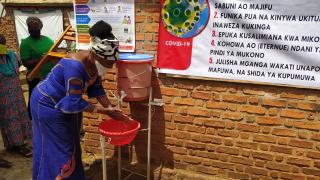
Many of the communities where we work lack piped water. With your support, we’ve installed handwashing stations at our training locations to prevent the spread of disease.
Women lead the fight against infection
With the right training and basic supplies, our participants are leading COVID-19 awareness efforts and introducing life-saving hygiene habits.
In Bauchi State, north-eastern Nigeria, we are currently implementing a three-year project funded by UK aid from the UK government. The majority of the women we serve in Bauchi State are subsistence farmers, who earn very little and have no financial safety net. Two months of COVID-19 lockdown made it even more difficult for them to provide for their basic household needs and maintain safe hygiene.
With the support of UK aid from the British people, our Nigeria team was able to rapidly respond to the situation in Bauchi with the provision of basic hygiene kits and food items for programme participants. Our trainers have also been prioritising COVID-19 awareness, prevention and referral information in training sessions since in-person training resumed – equipping women with tools to lead pandemic prevention and response efforts in their communities.
Two programme participants, Hassana and Saratu, told us about their experiences during the pandemic and how they have been taking action to protect themselves and their communities.
Hassana
Saratu
During the months of April and May, our community was on total lockdown as a result of the pandemic. Life became difficult as I could no longer carry out my business of making and selling steamed bean paste because schools, my target market, were closed. After some time, the little income my husband made as an okada rider (motorcycle taxi) was no longer able to support our needs. Before long, the little capital I had raised for my business vanished before my eyes and we were desperately seeking for ways to survive. I managed to make some money working for my neighbours as a farmhand, about $1.94 daily, which my family regarded as a huge blessing. At the same time, I worked on my own farm to grow food for us to eat."
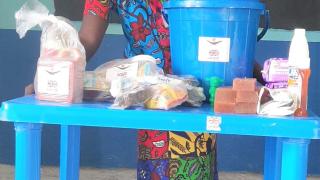
We also received food and hygiene packages from Women for Women International... I had not received any support from any one during this period of COVID-19 and it was the best gift I ever received.
Read more
We are pleased to share the results of our 24-month impact evaluation of our one-year programme the DRC.
World Teacher's Day
subtitle:
On World Teacher's Day, we asked three of our trainers to share their experiences of teaching during a global pandemic.
Coronavirus and women in South Sudan
subtitle:
The Coronavirus pandemic has highlighted an increased need for our work with women survivors of war. Donate today to help the women we serve survive COVID-19 and your gift will be matched at no extra cost to you.

